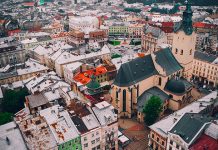Where are you from?
Inese: I was born in Latvia but moved to Shanghai, China when I was 20.
Eric: I was born in Shanghai China, but moved to Canada when I was 20. That was the same calendar year Inese moved to Shanghai. Weird coincidence.
Where do you currently live and what countries have you lived in together?
Inese & Eric: We currently live in Vancouver, Canada—which is the only place we’ve lived together, so far.
How did you meet? (And please give us the good, long story with all the details!)
Inese: Our story is quite a modern day romance. I was living and working in Shanghai, China at the time, totally in love with the city and my work and not even remotely thinking of dating, let alone moving or starting a family. Eric was living in Canada. I randomly joined an online network for Shanghai expats and received an e-mail from him asking all kinds of things about Shanghai and business there. “What an annoying person,” I thought to myself but nevertheless replied to the e-mail out of mere politeness.
We e-mailed back and forth a while; he came across so arrogant and self-confident that I made it my goal to not give up and teach him a lesson. After few months he was coming to Shanghai for a visit and wanted to take me out for lunch. To follow my plan, I decided to meet him, put an end to his arrogance and never see him again. But what I saw was a very polite, well-mannered and well-versed guy who brought me books from Canada and took me to Shanghai Museum (and that’s pretty much half way to my heart). So the rest is history—we had a year of long-distance relationship and eventually, after much thinking, pondering and doubting (from my side), I decided to move to Canada. It was immensely hard to leave the city I was living in for the past 10 years and regarded it as my second home. Mind you, I even had culture shock after arriving in Canada—something I didn’t see coming. Only with the birth of our son, I finally saw that it was the right decision.
How old are your children and where were they born?
Inese & Eric: So far we have one boy. Niklaav is year and a half old and was born in Canada.
What passports do you and the kids hold?
Inese: I have a Latvian passport.
Eric: I hold a Canadian passport and so does Niklaav. However, Latvian Immigration and Citizenship Department has recently passed a new law, where a child born in Canada to a Latvian parent is eligible for a Latvian passport, and is permitted to hold dual citizenship. We will be applying for his Latvian passport shortly.
What languages do you each speak and what language do you speak together?
Inese: I speak Latvian, English, Mandarin Chinese, Russian and some Japanese.
Eric: I speak English, Mandarin Chinese, Shanghainese dialect and some Latvian (thanks to Inese).
In what languages do you speak to the kids?
Inese: I speak to him in Latvian. It just seems the most natural to me.
Eric: I speak English (to Niklaav), but we are sure he also hears some Mandarin Chinese when we sometimes talk to each other. In addition, I want him to learn some German as this is Inese’s heritage, actually.
What languages do the kids speak?
Inese & Eric: He doesn’t really speak in sentences yet, just random words. However he understands and responds to Latvian as well as English. He has picked up words in both languages and uses them with each parent accordingly.
How do you reinforce the languages beyond just the parents speaking it?
Inese: We have a lot of story and activity books in Latvian, English and also Chinese (for later). My parents have saved quite a few story and rhyme books from my childhood and now have passed them on to Niklaav. It’s a great feeling to read to my son the books my mom used to read to me when I was his age. I also have playdates for our son with a few other Latvian moms in the area to reinforce the use of the language. As for English, once we leave our house, it is everywhere. We often go to local library to borrow English story books, play with other kids and attend community organized toddler story time and singing sessions.
Eric: He doesn’t attend a kindergarten yet. But when he does we are planning to enroll him in one that offers Mandarin Chinese immersion so he can start learning Chinese.
Inese: I was thinking of playing Crayon Shinchyan (a Japanese cartoon series) dubbed in Chinese for our son, but I am afraid he will pick up too many tricks and misbehaviors (although, cute ones) from the cartoon.
Why is raising bilingual/trilingual kids important to you?
Inese: I want our son to be aware of his roots and understand the culture and history behind each language. Each of them is so different and so unique. It is not only about learning and understanding our family origins, but also, through this, be accepting and open to other cultures, and broaden his perception of the world and all the new things, experiences and opportunities it can bring.
Eric: Every language brings its own world along, makes you think and see in terms of different culture. I want him to feel at home anywhere in the world and be curious of anything new.
What religion are you both? And how are you raising the kids?
Inese: I consider myself a half-practicing Christian, but have studied too many religions at university and have a rather philosophical approach to the topic to firmly assign myself to any of them. I was brought up celebrating main Christian holidays, as both of my parents are Christians, and we carry this tradition in our family, as well. Niklaav is free to follow any religion (if any) he wants when he is older. For me it is more about tolerance, compassion and universal human virtues in general, regardless of religion.
Eric: I am not really a religious person, but I have no problem celebrating Christian holidays with my family. Same as Inese, I have no objections to Niklaav choosing a religion of his liking. Most important is to be an understanding, accepting and honest person; religion is secondary. A person can follow a religious tradition, but be mean and unpleasant at the same time.
What are some of your family’s favorite things to eat?
Inese: We both were brought up with a strong tradition of daily family meals, so good home-cooked food and good company are a must—it’s the secret ingredient to make food taste great. Being an intercultural family, we already have a large variety of dishes to choose from by default. Plus we both love East and Southeast Asian food. So our weekly menu looks very mixed and it is really hard to pick our absolute favorites. However Shanghai style wonton soup and xiaolongbao — 小笼包 (steamed juicy dumpling buns), Korean bibimbap, and Latvian sorrel soup is something I can have any time of the day, any day. My mother-in-law makes the best wonton soup and knows how much I love it, so every time she visits us, she makes sure to stock our freezer with home-made wontons to last us quite a while.
Eric: I’d also like to add curry, dim-sum, and sushi/ sashimi to the list. Inese makes the best curries. Niklaav is still too young for them, but I can’t wait to let him try it when he is older.
What’s the best place you’ve been on vacation with your kid?
Eric: Latvia (visiting Inese’s parents) is the only place abroad we’ve taken him so far, but can’t complain after visiting all the castles, palaces, and a stretch of the Baltic coastline. It was a great vacation for us and for our son— he has seen so many new places, tried new foods and splashed in the warm waters of Latvian lakes. I’ve heard people saying that a vacation with kids is actually a vacation only for a kid, not parents. But Niklaav has been so great and curious all along, that we all really enjoyed the stay.
What are a few of your child’s favorite books?
Inese: He started to show interest in books (not just in order to tear the pages out) a good few months ago. He has numerous hard-paged books with simple stories and rich illustrations. However, I am also trying to read him longer rhymes and kids’ poems in Latvian. He clearly remembers one of them and gets really excited, when I start reciting it (Yes, I have already learned it by heart). The great journey in the world of books has just begun and I hope our son will have many more favorite books in the coming years.
Eric: He loves cars, so any car magazine with a good number of photos can keep him occupied for quite a while. The most recent fascination, however, is a Lego catalogue I picked up for him in a toy store.
What are some of your biggest cultural differences?
Inese: I have spent a decade in Shanghai surrounded by local culture, customs and lifestyle, so I would easily understand Eric’s side of the story if there would be an argument. Eric has spent his prime years in Canada and he thinks more like a Canadian than a Chinese, so most of the times he understands me and my way of thinking. Funny, but if we do have a random disagreement or rather a dispute (mainly on what’s best for our son) based on different cultural grounds, it is a stand-off between Canadian and Latvian culture or lifestyle, not Chinese and Latvian culture. For example, it is a rare sight to see a pram on Vancouver streets. In Latvia, and Europe in general, a baby is put in a pram in a lying position until he can show firm signs of being able to sit up and hold his neck. In Canada babies are usually placed in half-upright strollers or car-seat compatible travel systems. I was not comfortable with this thought, so we ended up ordering a pram from Germany. Also putting him in his own room when he was just a few months old didn’t cut it for me, although Eric was eager to do so. We still sleep in same bedroom, Niklaav just has a separate bed for himself.
What have been your greatest challenges as an intercultural family?
Inese: I think, the real challenges are still ahead of us and are more about our son than us. Picking out the right school for him is already on our priority list. It is important to provide an environment, where mutual respect and quality of social interactions and skills are as important as academic development.
Eric: It is not a challenge now, but we will have to provide a setting and conditions where Niklaav has equal access and practice of all three languages. English might not be that big of a problem, but Latvian and Mandarin Chinese will require some additional work in future.
What have been your greatest joys as an intercultural family?
Inese: I am really happy we can balance three very different cultures and lifestyles within one household in a way, that one is not overpowering the other. We have so many holidays and festivals to celebrate every year, and I am happy we have one more person to share the joy with—our son. It is also great fun switching between languages, when we talk and making linguistic jokes. I often prefer to talk in Mandarin Chinese, as the words are shorter than in English and I can get my point across faster. And my very personal joy (not as a family) of being a multilingual bookworm is the priceless ability to read some of the world’s greatest literature pieces in their original language.
Eric: It is great to be able to take the best from all these cultures and incorporate it in our daily lives. There is always something new to learn and life never gets boring. For example, Latvians have an old wisdom to predict weather patterns, even weather for coming seasons, just by observing current weather conditions and bird and insect behavior. It doesn’t necessarily work for Canadian weather, but in Latvia, Inese’s predictions are always spot on.
Anything else you would like to add?
Inese & Eric: Just like us, we hope other families can savoir every experience, enjoy every moment together and do what they feel is right for their children and families, regardless of what others might be saying or thinking.
Thanks so much Inese and Eric!




































